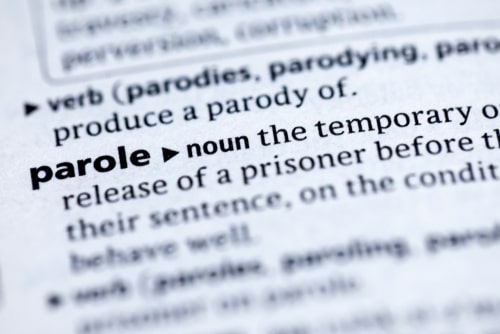Recent Blog Posts
The Latest Updates to Texas Parole Special Conditions Policy
 If you or a loved one is on parole or facing potential parole, it is essential to have a Texas lawyer who stays current on the latest policies from the Texas Department of Criminal Justice (TDCJ). The TDCJ recently released an updated policy, effective November 30, 2023, regarding the imposition, withdrawal, and modification of special conditions for parolees through their Offender Information Management System (OIMS).
If you or a loved one is on parole or facing potential parole, it is essential to have a Texas lawyer who stays current on the latest policies from the Texas Department of Criminal Justice (TDCJ). The TDCJ recently released an updated policy, effective November 30, 2023, regarding the imposition, withdrawal, and modification of special conditions for parolees through their Offender Information Management System (OIMS).
What are Parole Special Conditions?
When an individual is granted parole or mandatory supervision release, the Board of Pardons and Paroles (BPP) can impose special conditions on top of the standard conditions of release. These could include things like mandating participation in substance abuse treatment, restricting travel outside specified counties, prohibiting contact with minors, requiring sex offender registration and treatment, and many others.
Key Changes in the New Policy
The new policy clarifies the procedures for parole officers to request changes to a parolee’s special conditions after release. The goal is to allow for modifications based on the parolee’s needs, progress in programming, and overall rehabilitation, while still meeting public safety requirements. Certain conditions can be satisfied directly by the parole officer in OIMS once the parolee completes the mandated programming, such as anger management classes or educational skill benchmarks.
What to Know About the Texas Senate Bill 4 (SB 4)
 As the laws change, legal professionals and the public must stay informed about new legislation that may impact lives and careers. One such piece of legislation is Senate Bill 4 (SB 4), passed by the 88th Texas Legislature during its fourth special session in 2023. A Texas lawyer can help you understand the potential implications if you face criminal charges.
As the laws change, legal professionals and the public must stay informed about new legislation that may impact lives and careers. One such piece of legislation is Senate Bill 4 (SB 4), passed by the 88th Texas Legislature during its fourth special session in 2023. A Texas lawyer can help you understand the potential implications if you face criminal charges.
New Criminal Offenses Under SB 4
SB 4 introduces several significant changes to the Texas Penal Code, particularly in Chapter 51. These changes include the creation of new criminal offenses related to immigration, such as Illegal Entry From a Foreign Nation, Illegal Reentry by Certain Aliens, and Refusal to Comply with an Order to Return to a Foreign Nation. Individuals facing criminal charges must understand these new offenses and the potential consequences.
Information on Clearing Your Criminal Record in Texas
 Under Texas law, those with certain qualifying criminal offenses may be eligible to clear their record through either an expunction or a non-disclosure. These legal processes can provide a clean slate and open up jobs and other life opportunities that a criminal history may have otherwise restricted. A Texas lawyer can help determine if you have the potential to clear your record.
Under Texas law, those with certain qualifying criminal offenses may be eligible to clear their record through either an expunction or a non-disclosure. These legal processes can provide a clean slate and open up jobs and other life opportunities that a criminal history may have otherwise restricted. A Texas lawyer can help determine if you have the potential to clear your record.
What is an Expunction?
An expunction, also called an expungement, is the destruction of arrest records. It treats the arrest as though it never occurred. To qualify for an expunction in Texas, you must have been arrested but not charged with an offense, had charges dismissed, acquitted, or pardoned. Also, the statute of limitations cannot have expired if no charges were brought.
If granted an expunction, agencies and entities with your arrest records must destroy them. Your records are removed from public access, and you may legally deny that the arrest ever happened or that records exist. Certain types of records, such as records of your arrest held by federal agencies, are not subject to expunction.
Understanding the Factors Behind Parole Approval or Denial
 Parole is a critical aspect of the criminal justice system in Texas, providing an opportunity for incarcerated individuals to reintegrate into society before completing their full sentence. However, the decision to grant or deny parole is a complex process that involves careful evaluation of various factors. When seeking to navigate issues related to parole, it is essential to retain the services of an experienced criminal defense attorney
Parole is a critical aspect of the criminal justice system in Texas, providing an opportunity for incarcerated individuals to reintegrate into society before completing their full sentence. However, the decision to grant or deny parole is a complex process that involves careful evaluation of various factors. When seeking to navigate issues related to parole, it is essential to retain the services of an experienced criminal defense attorney
Factors Affecting Whether Parole is Approved or Denied
-
Offense severity and criminal history – One of the primary factors influencing parole decisions is the nature and severity of the offense committed. Serious crimes, such as violent offenses or those involving weapons, may decrease the likelihood of parole approval. Additionally, an individual’s criminal history, including prior convictions and parole violations, can significantly impact the parole board’s decision
What to Know About State Writ of Habeas Corpus in Texas
 The state writ of habeas corpus is a fundamental legal concept that protects individual rights in Texas. A state writ of habeas corpus may be worthwhile if you have been convicted of a crime and are currently pursuing post-conviction relief. To get started on the process of fighting your wrongful conviction or unfair sentence, contact an experienced Texas criminal defense lawyer. Experienced legal guidance is imperative as you navigate state law and pursue a favorable conclusion to your legal situation.
The state writ of habeas corpus is a fundamental legal concept that protects individual rights in Texas. A state writ of habeas corpus may be worthwhile if you have been convicted of a crime and are currently pursuing post-conviction relief. To get started on the process of fighting your wrongful conviction or unfair sentence, contact an experienced Texas criminal defense lawyer. Experienced legal guidance is imperative as you navigate state law and pursue a favorable conclusion to your legal situation.
Definition and Purpose of State Writ of Habeas Corpus
In Texas, the state writ of habeas corpus is a legal mechanism that allows individuals to challenge their detention or imprisonment. Its purpose is to safeguard against unlawful or unconstitutional imprisonment by providing a means for people to seek relief from wrongful confinement. A state writ of habeas corpus in Texas is essential for protecting individual liberties and ensuring that the justice system operates fairly and justly.
Facing Marijuana-Related Charges in Texas
 Marijuana laws vary significantly across different states, and Texas has some of the strictest regulations regarding the possession and use of marijuana and products containing THC, such as e-cigarettes, lotions, waxes, and more. For those unaware, THC is the psychoactive compound found in marijuana. Understanding the legal consequences associated with these charges is crucial for individuals to make informed decisions as they seek to fight such charges and pursue a favorable case conclusion. And there is no better way to navigate the legal system than to hire a professional. Your lawyer will be your guide through all facets of your case.
Marijuana laws vary significantly across different states, and Texas has some of the strictest regulations regarding the possession and use of marijuana and products containing THC, such as e-cigarettes, lotions, waxes, and more. For those unaware, THC is the psychoactive compound found in marijuana. Understanding the legal consequences associated with these charges is crucial for individuals to make informed decisions as they seek to fight such charges and pursue a favorable case conclusion. And there is no better way to navigate the legal system than to hire a professional. Your lawyer will be your guide through all facets of your case.
Possession of Products Containing THC in Texas
In Texas, possession of marijuana products containing THC is illegal under state law. The severity of the penalties depends on the amount of THC involved and the circumstances surrounding the possession. Possession of less than two ounces of marijuana or products with THC is considered a Class B misdemeanor, leading to 180 days in jail and a fine of up to $2,000. Meanwhile, possession of two to four ounces is a Class A misdemeanor, carrying a potential jail term of one year and a fine up to $4,000.
Is Fleeing a DWI in a Vehicle a Felony Offense?

Driving while intoxicated (DWI) is a serious crime in Texas, and attempting to flee the scene can lead to even more severe consequences. In Texas, fleeing the scene of a DWI in a vehicle can result in felony charges being brought against you. If you are facing felony charges related to fleeing the scene of a suspected DWI, you must seriously consider hiring a criminal defense lawyer. When facing charges such as this, you need to do everything in your power to fight for your rights and freedom. Hiring a lawyer is a wise first step in combating these very serious charges.
Understanding DWI Laws in Texas
It is well known that in Texas, a person is considered legally intoxicated if their blood alcohol concentration (BAC) is 0.08 percent or higher. A DWI conviction can result in prison time, alcohol education classes, license revocations, and more. However, the severity of the offense
Can My DWI Be Charged as a Felony?
 In Texas, a DWI (Driving While Intoxicated) offense can be charged as a felony. While a first-time DWI offense is typically a misdemeanor offense, subsequent offenses or specific aggravating factors can elevate the charge to a felony. If you have been charged with felony DWI, you need to seriously consider hiring a lawyer. Failing to hire a lawyer will almost certainly result in a negative case outcome.
In Texas, a DWI (Driving While Intoxicated) offense can be charged as a felony. While a first-time DWI offense is typically a misdemeanor offense, subsequent offenses or specific aggravating factors can elevate the charge to a felony. If you have been charged with felony DWI, you need to seriously consider hiring a lawyer. Failing to hire a lawyer will almost certainly result in a negative case outcome.
Understanding When DWI is Considered a Felony
Here are examples of when DWI can be charged as a felony, including:
-
Intoxication assault – A DWI can also be charged as a felony if it causes serious bodily injury to another person. This offense, referred to as intoxication assault, is considered a third-degree felony in Texas. If it can be proven that the driver was operating their vehicle while intoxicated and caused an accident resulting in serious bodily harm to another person, they could face felony charges.
Should I Settle My Criminal Case or Go to Trial?
 When facing criminal charges, one of the most significant decisions someone can make is whether to try and settle a case by making a plea bargain with the prosecution or try to avoid a conviction by going to a trial. Like with any important decision, there are important factors to consider, as this decision will likely have a major impact on your reputation, freedom, and future. To help you evaluate your options as you navigate the Texas criminal justice system, contact an attorney to discuss how best to move forward.
When facing criminal charges, one of the most significant decisions someone can make is whether to try and settle a case by making a plea bargain with the prosecution or try to avoid a conviction by going to a trial. Like with any important decision, there are important factors to consider, as this decision will likely have a major impact on your reputation, freedom, and future. To help you evaluate your options as you navigate the Texas criminal justice system, contact an attorney to discuss how best to move forward.
What Are the Advantages of Taking a Plea Bargain?
Here are some examples of the advantages of taking a plea deal, including:
-
Increased certainty – By choosing a plea deal, you gain more control over the outcome of your case. Negotiating a plea deal allows you to have a say in the terms of your sentencing, potentially leading to a more favorable resolution.
How does an inmate's medical condition affect his parole review in Texas?
 Sometimes my clients get sick while serving their Texas felony prison sentences. Sometimes they are already sick and their condition worsens. Obviously, if we are fighting to get a client released to parole, his health can be an important factor for the Board to consider. Below I try to set out common issues that arise when advocating for a sick or physically compromised client.
Sometimes my clients get sick while serving their Texas felony prison sentences. Sometimes they are already sick and their condition worsens. Obviously, if we are fighting to get a client released to parole, his health can be an important factor for the Board to consider. Below I try to set out common issues that arise when advocating for a sick or physically compromised client.
TDCJ Medically Recommended Intensive Supervision
If a client is terminally ill, he may be eligible for special review and release to parole under TDCJ’s “MRIS” program (Medically Recommended Intensive Supervision). The requirements are strict. As a threshold issue, you have to be terminally ill, over the age of 65, mentally ill, developmentally disabled, require long term intensive medical care, have an organic brain syndrome, or be in a persistent vegetative state. Additionally, only inmates convicted of non-violent and non-sexually assaultive offenses can normally qualify (except that if an inmate is in a vegetative state he may be released under MRIS even if he was convicted of a sexual assault offense).







